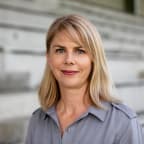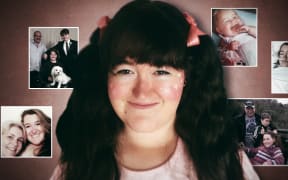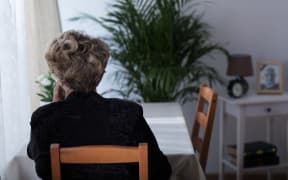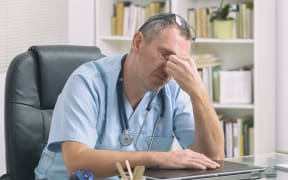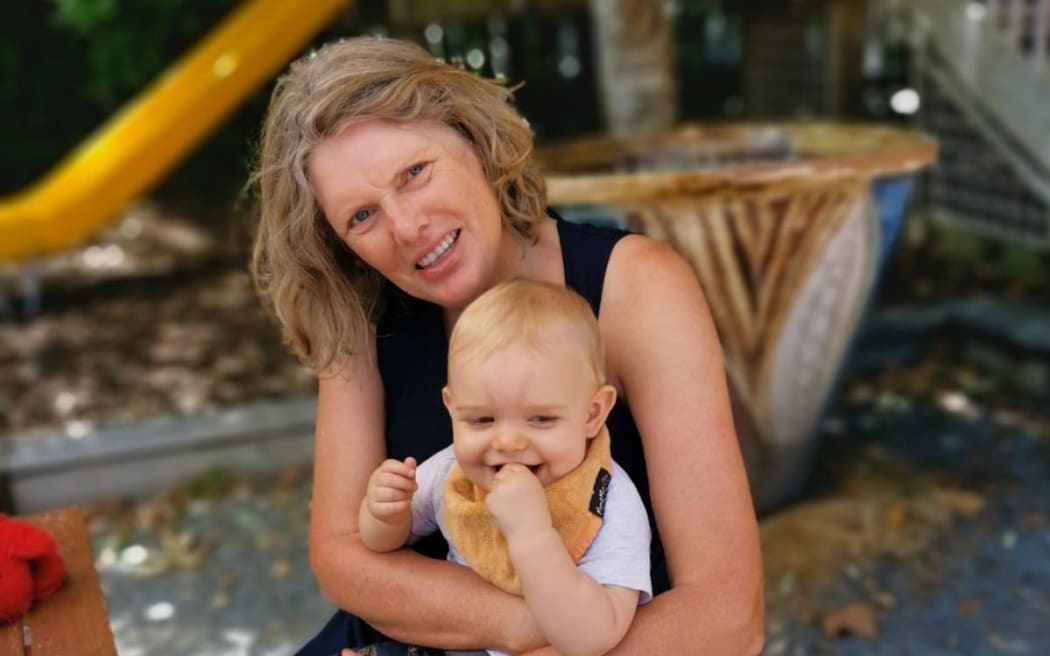
Joyanne Lovatt with her grandson. She says after surgery for lymphoedema in Sydney she now has the energy to chase after her grandchildren. Photo: Supplied / Joyanne Lovatt
Melanoma survivor Joyanne Lovatt says her right leg has been a constant reminder of her battle with cancer.
A decade ago she had lymph nodes removed from her groin during treatment and developed the chronic condition lymphoedema as a result - swelling that occurs when the lymphatic system is not working properly.
"I always looked at it as bottles of milk, that I had three two litre bottles of milk attached to one leg that I was dragging around," she said.
"You feel like you've been shortchanged in that you've done this huge battle and you've won, yet you've got this big heavy thing that you have to lug every day."
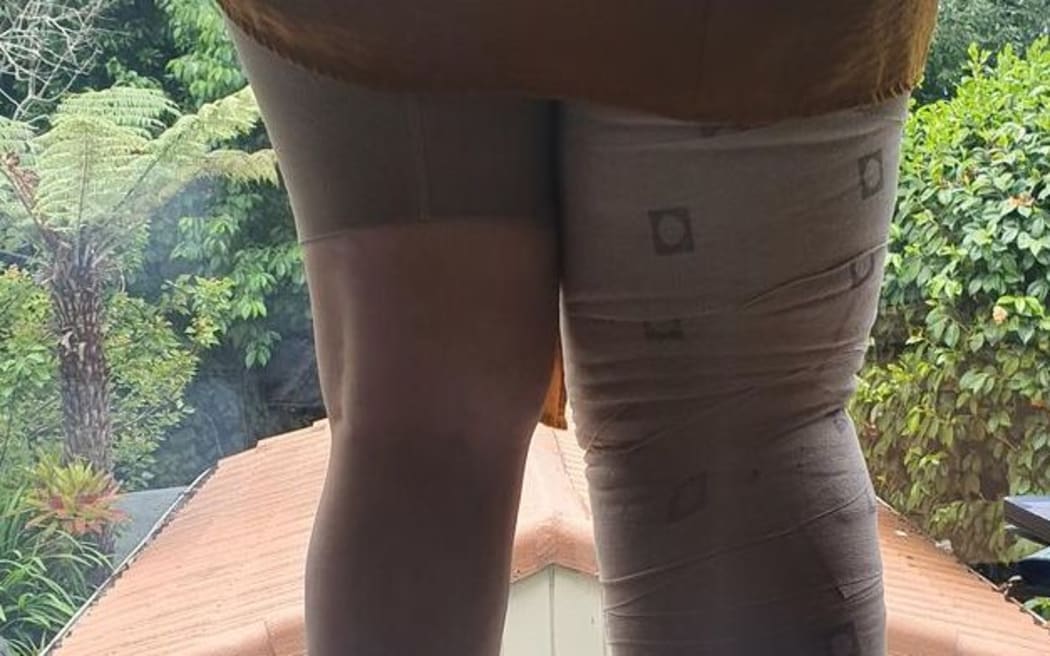
Joyanne Lovatt's legs before the surgery. Photo: Supplied / Joyanne Lovatt
Lovatt is among people with the condition who are choosing to go to Australia for surgical treatment that is not offered here, and paying out of their own pocket.
In October, Lovatt had seven-and-a-half litres of fluid and fat removed from her leg during specialist lyposuction surgery.
The surgery has been life-changing - a few years ago Lovatt stopped working as an early childhood teacher because she could not crouch on the ground or run after children and the lymphoedema caused regular bouts of painful cellulitis.
At one point, Lovatt said she wanted her leg amputated.
"I talked to my surgeon and he said he's had other people like it who've gone to their doctors and said can you just please take it off, take my leg off."
Are you affected by lymphoedema? If you are willing to discuss your experience please email news@rnz.co.nz
The cost of going to Australia for surgery was a barrier until family and friends stepped in to cover the $40,000 bill while she waited to hear whether the government would fund the treatment. The application was lodged over a year ago.
Te Whatu Ora said it received very few applications for this treatment and has not funded any since 2018.
'Impacts people's body image'
The Australian Lymphoedema Education, Research and Treatment Programme offers the surgery and its director, Dr Louise Koelmeyer, said the condition was a disability.
"It significantly impacts people's body image, their relationships, and they look like a bit of a freak out there. It's a daily reminder of the fact that they've been through cancer treatment and this is one of the long-term side-effects."
Around one fifth of cancer survivors who have had a lymph node removed will develop lymphoedema and it is prevalent among woman who have undergone treatment for breast cancer.
Dr Koelmeyer said a small number of people benefit greatly from surgical treatment - 17 lymphoedema patients have travelled from New Zealand to Sydney for surgical treatment in the past five years.
"I'd say we're only getting the tip of the iceberg of those people who are so motivated and want to do anything," she said.
"You've probably got a large group of people who are interested in this but the barriers are financial or time, travelling to Australia limits their ability to be able to do it."
Patients who travel for the surgery from New Zealand spend three weeks at the clinic after the operation for ongoing specialist care, then return to the clinic after three months for a post-operation checkup.
Lymphoedema is treated with massage to help drain fluid, bandaging and compression garments but the way this is funded varies between regions.
'Huge inequity'
Together with one other physiotherapist, Yvonne Ferguson treats more than 300 lymphoedema patients in the Nelson region where patients have access to two compression garments every six months - which she said was best practice.
"It's not just the surgical things that are lacking in New Zealand. We're pushing even for garments because there's a huge inequity, it depends on your postcode. If you live in Nelson, and I've fought for this to be maintained, you get two compression garments every six months. If you live in Wellington or Christchurch you pay for your own," she said.
"And there's a lack of services. Wellington Hospital doesn't even have a public lymphoedema service."
She has referred some patients for surgery in Sydney but was frustrated their lymphoedema got to the stage they needed such intervention and said there was a need for better screening.
"If we can pick it up when it's sub-clinical it's reversible. It's before you can see it or measure it with a tape measure."
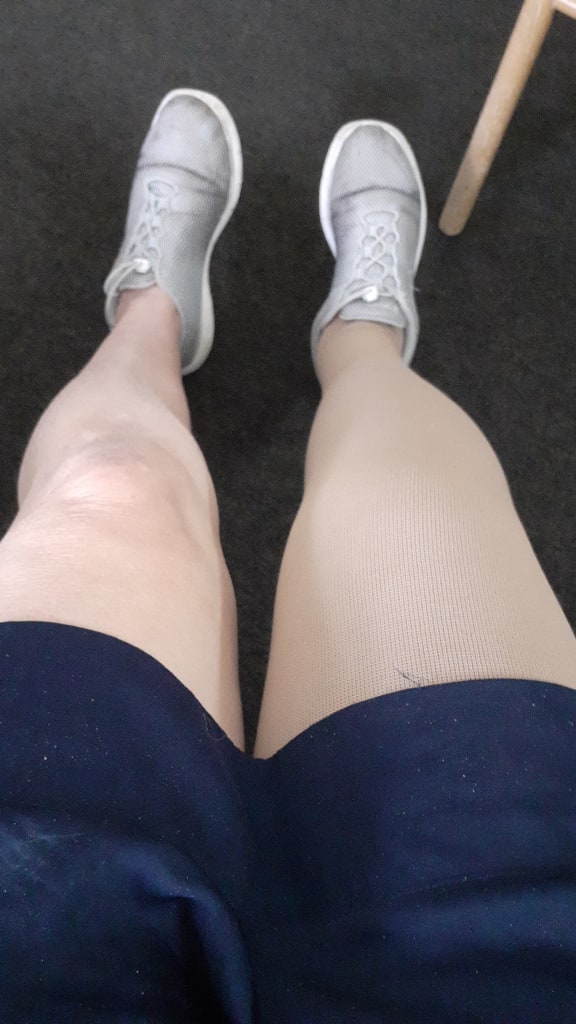
Joyanne Lovatt's legs after surgery. Photo: Supplied / Joyanne Lovatt
The Australasian Lymphology Association, which represents over 700 lymphoedema therapists, sent a letter to the then minister of health David Clark in 2019, calling for the government to address inconsistencies in the funding of compression garments and the provision of services.
"We would strongly advocate for increasing assistance for this hugely disadvantaged patient group, via specially allocated funding for lymphoedema management and a fairer system for all to receive the compression garments they require," the association's president Leonie Naumann wrote at the time.
Ferguson who is on the association's equity committee said its calls have fallen on deaf ears and it was revisiting the request with Te Whatu Ora.
Having experienced chronic lymphoedema, Joyanne Lovatt would also like to see the inequities addressed.
She said funding the surgical treatment in Australia would be cost-neutral based on ongoing treatment costs and the potential for complications such as cellulitis.
"It just really breaks my heart that there are so many people who are still having these conservative treatments and they are working so hard, the physiotherapists, to try and keep these people active and mobile and having some sort of quality of life but there's no funding to have a treatment that will give you that back after everything that you've been through."
She will return to the Sydney clinic in January for a checkup and said wearing a compression garment to prevent lymphoedema returning was a small price to pay for her mobility.
"It just felt miraculous, I can't describe it. Look, look look I kept saying to the doctors and nurses, look at my leg."
Having just turned 60, she has been given a new lease of life.
"The thing that I am excited about is being able to chase my grandchildren and being able to run and catch them and scoop them up."
